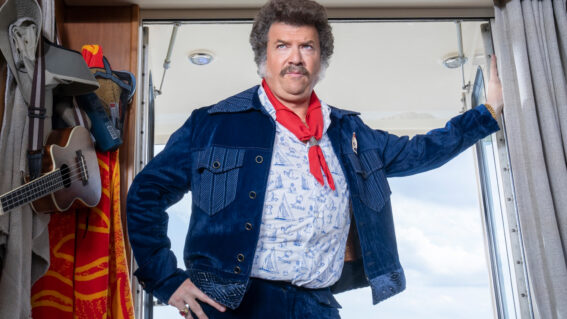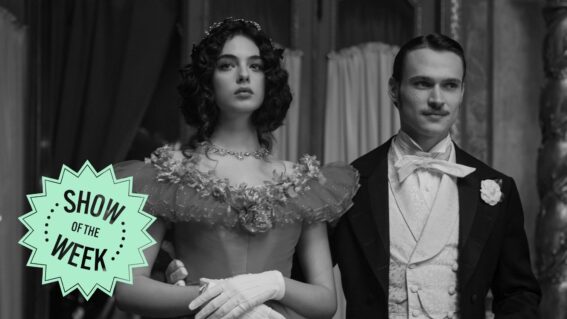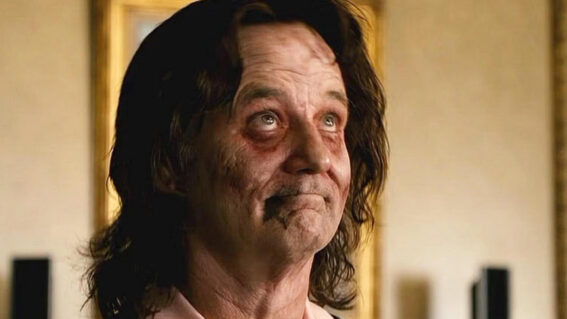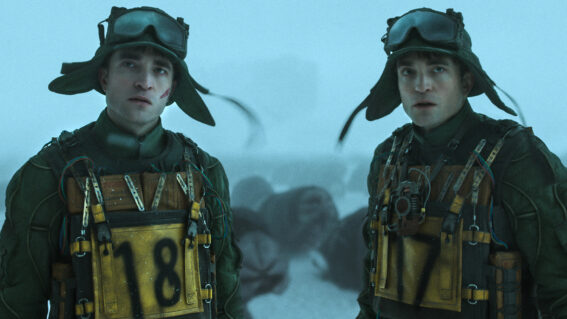The Films That Never Were

There’s almost no point anymore in saying things like “Hollywood is a strange, fickle and bizarre place”.
After all, this is hardly news to anyone these days and that in particular atmosphere of grin-and-bear-it absurdity we’ve seen the birth of many great cinematic masterpieces of our time…plus the expansive sea of mind-rapingly awful mediocrities that make up the bulk of Hollywood’s recent output. In this pressure-cooker environment of adrenaline and caffeine fueled meetings where old men in suits duel against starving screenwriters and aloof directors, naturally creative ideas tend to change, evolve, u-turn and sometimes even slip right through the cracks. Movies that start out being about one thing become something completely different; changing genres, plot-lines and sometimes even the species of the central protagonist!
With two other bloggers on our site taking up the topics of “When Great Films Don’t Happen” and “When Great Films Do Happen, But Then Happen To Be Awful”, I thought I’d throw my two cents in with a brief look at some of the most notable unproduced and/or creatively diverted films of recent times.
Pop Quiz Hotshot — what do the above three films have in common? Give up? I’ll tell you then: they all started as the same movie.
“Beverly Hills Cop“ was the brainchild of screenwriter Danilo Bach who wrote the film in 1977 as a story about an East L.A. cop who transfers to Beverly Hills. It took almost seven years for his script to be realized to the silver screen and along the way it picked up some strange passengers, most namely Sylvester Stallone who was still riding the Rocky/Rambo high and having significant input into the writing of his films. Stallone’s requirements was to shape the film into a more action-orientated project and he thus incorporated plot elements from a novel the studio had rights to: Paula Gosling’s “Fair Game“. When supposedly both Stallone and the studio were creatively dissatisfied with the development of the project, Stallone walked and took his own unique draft with him and the project was retooled in a mere two weeks as a comedy vehicle for rising stand-up comic Eddie Murphy (who filled the script’s hastily re-written scenes with his own adlibbed dialogue and gag ideas).
Three years later, Stallone’s retitled script became the extremely violent “Cobra“ which was a box-office smash, despite extreme critical derision, though it only did one-third of the $300 million US box-office takings earned by the Eddie Murphy helmed version of “Beverly Hills Cop“. Paula Gosling’s novel eventually got its own day in the sun as a vehicle for Cindy Crawford and Billy Baldwin in 1995 where it landed as a critical and box-office turkey, going to show that sometimes a Hollywood bastardization can still outstrip a faithful adaptation for both content and audience satisfaction.
Of course there are more recent examples of strange creative turnarounds happening on projects:
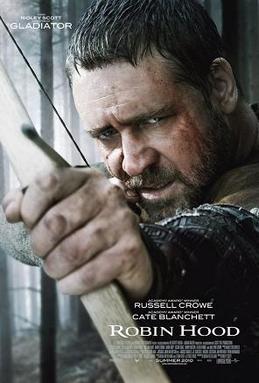
Pop Quiz Hotshot — in the original script for this film, who was the central character? The answer: The Sheriff of Nottingham.
Ridley Scott’s 2010 production of “Robin Hood” had its beginnings one of the hottest, most sought-after scripts in Hollywood. In 2007, La-La-Land was in a bidding war for a spec-script entitled “Nottingham” which told the tale of a sympathetic and budding amateur sleuth Sheriff of Nottingham who, in his search for the criminal Robin Hood, becomes entangled in the rebellion against King John and a love-triangle for the affections of Maid Marion. Dubbed mostly as a forensic political thriller – a ‘CSI: Sherwood Forest’ if you will – the project was eventually given to Ridley Scott (who’s previous film project “Kingdom of Heaven” ironically takes place a mere couple of years before the setting of this film) who finds ‘Hollywood’s hottest script’ less than palatable to his tastes. Entrenched in the notion of creating the ‘ultimate’ Robin Hood film, Scott creates another version where the Sheriff and Robin Hood are the same person and then, eventually, ditches the Sheriff and medieval forensic science angle entirely for a straight Robin Hood prequel showing how the outlaw ends up in living as a bandit.
The film’s modest success certainly hasn’t hurt the resultant film too badly, despite the numerous production problems incurred by the excessive rewrites, but one cannot help and wonder whether there was room in this world for the original intended film?

Pop Quiz Hotshot — the above movie was originally a completely different genre. What kind of film was it? The answer: a dark and bleak drama about the horrors of prostitution.
Originally titled “$3,000“, the script for “Pretty Woman” told the story of a cocaine-addicted hooker who engages in a turbulent relationship with a rich man who tries to help, but ultimately abandons her. Her only goal in life: to visit Disneyland, a task seemingly impossible because of her drug and pimp problems and her abusive relationships with her friends. At some point late during pre-production a conscious decision was made by Disney executives to retool the film as a modern-day fairytale and aim it as a romance film, citing the Pygmalionesque quality of the story elements and the resemblance to the musical “My Fair Lady“. In this particular case, it seems clearer heads certainly prevailed given the film’s tremendous success and WGA and BAFTA nominations for the film’s writer J.F. Lawton.
Pop Quiz Hotshot — what does a 1968 Frank Sinatra film have to do with one of the most enduring and influential action movies of all time? The answer: the Sinatra movie is adapted from a novel called “The Detective“…and the action film is adapted from that novel’s sequel: “Nothing Lasts Forever“.
The 1968 film “The Detective” was a strong, well-received and successful mark on Sinatra’s late career, but nobody could have conceived what the sequel to the novel it was based on would do to modern cinema. In 1975, writer Roderick Thorp watched “The Towering Inferno” at his local movie house and was immediately seized with the idea of a skyscraper being the setting for a terrorist-hostage situation. Thorp released the sequel to his hit novel in 1979, entitled “Nothing Lasts Forever“. The rights quickly sold to 20th Century Fox, Thorp and producers approached Sinatra to reprise the role of Detective John Leland for the film, but Old Blue Eyes passed on the offer. The movie was then retooled as a potential sequel to Schwarzenegger’s “Commando“, but Ah-nuld himself wasn’t interested and eventually the movie was slowly developed into a stand-alone piece: Detective John Leland becoming Officer John McClaine (Bruce Willis) his daughter Stephanie Gennaro becoming now wife Holly Gennaro (Bonnie Bedelia) and terrorist Tony Gruber becoming the criminal mastermind Hans Gruber (Alan Rickman in one of the best debut-film performances ever). The movie was released in 1988 as “Die Hard” and still directly informs the language of modern pop culture as well as the style and devices of modern day action cinema. Certainly hard to imagine Frank Sinatra bungie-jumping off the top of the Fox Tower with a fire-hose!
In a strange case of history repeating itself, the film’s sequel “Die Hard 2: Die Harder” (gotta love those clever titles, Fox) was itself based on an unrelated novel by Walter Wagner entitled “58 Minutes“. In the final analysis, both “Die Hard” and “Die Hard 2” remain surprisingly faithful to their source materials.

But so far we’re only talking about films that were eventually made…what about all the films that never made it to the big screen? The unrealized masterpieces (or mediocrities) that still lurk in the desk drawers of various studio executives across the San Fernando Valley?
Well for starters, there are abandoned scripts for films that were made by other people: for instance the unfilmed versions of “Alien 3“, one draft written by “Pitch Black” and “Chronicles of Riddick” director David Twohy while another written by Mr Cyberpunk himself William Gibson! Almost ten different adaptations of Richard Matheison’s “I Am Legend” are apparently floating around, most reputedly far superior to the Will Smith film while there are apparently no less than seventeen adaptation attempts at Neil Gaiman’s “Sandman” and “Death” comics collectively, none of which will likely ever make it to the screen.
Or if you’re a fan of the recent superhero hype, there’s the various unfaithful adaptations of “Watchmen” which involve them traveling back in time to prevent 9/11 or the somewhat tongue-in-cheek “Superman Lives” script penned by Silent Bob himself: Kevin Smith which he claimed he wrote ‘under mental duress’. “Superman: The Movie” writer and director Tom Mankewicz and Richard Donner apparently teamed up in 1980 to write an unproduced “Batman” film and of course “Batman Returns” writer Daniel Waters penned an incredibly well-received, but twisted and unsellable sequel entitled “Catwoman” which had nothing to do with the Halle Berry turkey that followed a few years later.
Even the ‘big shots’ have missed the boat on a few projects: Stanley Kubrick was never able to film his “Napoleon” biopic, the script for which reportedly ran to over 400 pages in length at one point. James Cameron may never get around to producing his live-action adaptation of the manga “Battle Angel Alita” though his “Spider-Man” script was the basis for much of the content in the Sam Raimi trilogy.
It’s a funny industry, Hollywood. Naturally your mileage may vary depending on what excites you in terms of genre films and what doesn’t. For every missed opportunity for greatness, there are surely a hundred horrendous films we have been spared from by these ‘unproduced’ or ‘altered projects’. It’s hard to tell if we’ve dodged a bullet or lost a masterpiece with each of these examples, but you have to hand it to Hollywood: there’s nothing they won’t do for a good story, even if they have to kill a movie to do it.


